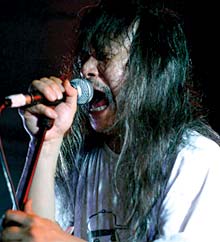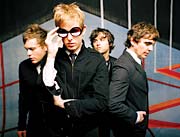When the book of rock ‘n’ roll has finally been written, one of the more unlikely names to pop up will be Can. Formed in Germany in 1968, Can was known as the genre-hopping, free-thinking purveyor of German progressive rock (known to others sometimes disparagingly as “krautrock”). Much of the band’s catalog was created through improvisations, and at the center of the maelstrom for four of the band’s most classic albums was lead singer Kenji “Damo” Suzuki.

Originally a busking improvisational musician, Suzuki’s presence in Can brought with it a vocal sound that was just as adventurous as his bandmates’ playing. While the band would slip in and out of sounds as disparate as psychedelic rock, jazz and funk, Suzuki’s vocals (which were also usually improvised) would drift in and out of English, German and French. It was (and still is) a sound that is indescribable and often left the band unable to reproduce what they had just created.
Now, 30 years after Can’s heyday in the German music scene, Suzuki is still creating and improvising. Only now he’s upped the ante. Instead of playing with a set group of musicians night after night, Suzuki is instead fronting Damo Suzuki’s Network, a band that features Suzuki backed by a rotating cast of musicians that varies from town to town.
Thanks to the combined efforts of local musical-agenda-setters Orbit DVD, Static Age Records and Harvest Records, Suzuki’s Network will be performing in Asheville as part of his month-long U.S. tour. But given the nature of improvised music—especially between musicians who have never played together—the chance of it turning into one big musical car crash is a concern.
Spoon makes music to go Ga Ga over
Everyone hates commuting to work, but when Spoon gets ready to work, it’s an all-day affair. With two members of the band living in the Pacific Northwest, and the other half living in Texas, the geographic reality throws a wet blanket over impromptu jam sessions.

To bassist Rob Pope, however, the separation is just a minor inconvenience.
“Living so far from each other isn’t really a big deal,” insists Pope. “When we get together, we just have to practice all day long.”
But the marathon practices are well worth it. Spoon’s latest album (their first in two years), Ga Ga Ga Ga Ga (Merge) is a tightly wound journey that finds its musical footing in a rather unusual place for some indie-rock bands—the soul and R&B music of the ‘60s and ‘70s.
“Everyone, especially on this record, kind of wore the R&B influence on our sleeves,” he says. “We were listening to Bill Withers and the Supremes during the making of the album.”
Pope notes that the genesis of Ga Ga Ga Ga Ga lay in the songwriting skill of lead singer/guitarist Britt Daniel, who also wrote music for the Will Ferrell film Stranger Than Fiction.
“Britt does the lion’s share of the songwriting,” admits Pope. “A lot of times he’ll come in, and he’ll have the song completely done, and sometimes we have to jam stuff out. The recording process always takes quite a long time.”
Even though the process may be lengthy, it’s also worth it. Six albums into their career, Spoon is still looking to find a new wrinkle in their sound. (Fitting, given that the band takes its name from one of the biggest hit songs by experimental krautrock outfit Can.) It’s a challenge Spoon takes very seriously.
“If you look at the first few records, they sound a lot different than what the band is doing now,” notes Pope. “We’re looking at new ways of doing things.”
Now if they could just do something about that commute.
who: Spoon with The Ponys
what: Soul-infused indie rock
where: Orange Peel
when: Wednesday, Oct. 24 (9 p.m. $20. www.theorangepeel.net or 225-5851)
“Everyone’s aware that they aren’t going to be playing every second,” says Asheville-based musician Chad McRorie, a guitarist who will be featured in the Asheville incarnation of The Network. “That’s why this group will be playing together: because I trust everyone to be thoughtful and without egos. We have some great players in this band, and what makes them great is that they don’t have to show how flashy they are.”
Even though Damo Suzuki is still creating music very much in the spirit of his former band, it’s not a nostalgia act. In fact, the works of his old band aren’t likely to be heard at all in the Asheville performance.
“It’s not going to sound like Can; it’s going to sound like us,” says Keef Rob, who has worked in other incarnations of Damo Suzuki’s Network, as well as in other experimental bands such as Faust and Cul de Sac. “There’s no way for it to sound like anybody but us.”
While the rising swells of instruments may lead to chaos or beauty, McRorie still considers it to be musical adventure that’s worthwhile.
“Why limit yourself?,” he asks. “Why put yourself as part of any scene? That’s what was so great about Damo and Can, was that they broke down those walls.”
In fact, some participating musicians see The Network as something bigger than just improvisational music and the broadening of musical palates: They view it as a nearly utopian musical conversation.
“A lot of what [Damo] is doing is breaking down [nationalistic walls],” Keef Rob explains. “He has this amazing ability of speaking in six languages at once, and you know exactly what he is saying. Music is a universal language that helps break down those walls.”
While the resulting sound of Damo Suzuki’s Network may be a bit more chaotic than utopian, it’s still bringing people together one listener (and player) at a time.
[Jason Bugg is a freelance writer based in Asheville.]
who: Damo Suzuki’s Network
what: An experimental, improvisational free-for-all
where: Grey Eagle
when: Saturday, Oct. 20 (10 p.m. $10. www.thegreyeagle.com or 232-5800)



Thanks for everyone that showed up last night. I was a little apprehensive at first, but Damo and the band gelled immediately (including Damo’s driver who hasn’t played bass in 20 years!) and everyone had a great time.
For those at Leaf or afraid of the word “improv,” Damo has a three year visa and will definitely be back next year.
marc